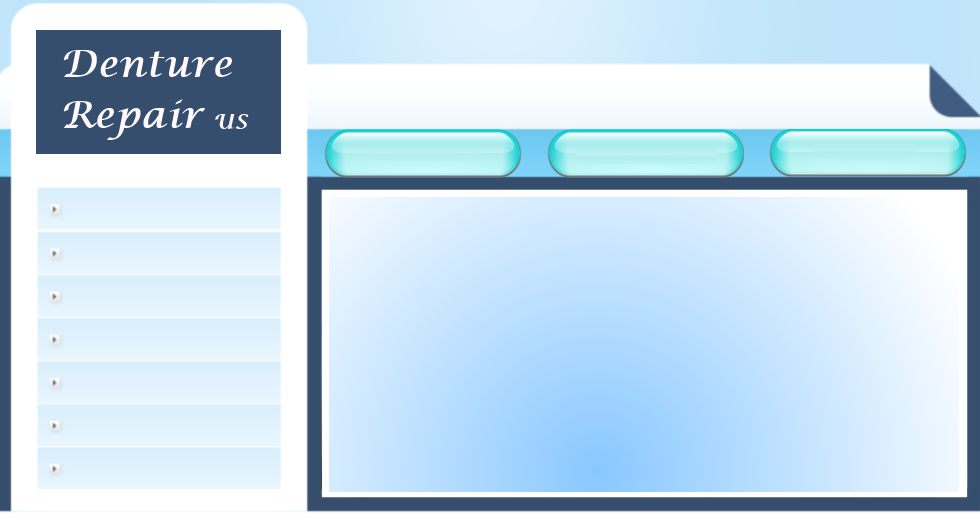

Our Denture Repair Center is happy to provide both denture repair and denture duplication! We want to ensure that you are 100% comfortable sending us your broken denture or the denture you would like us to copy. Please feel free to give us a call Toll Free at 1-888-252-4778 if you have any questions or concerns.
Save when you have a duplicate made during a denture repair!
Urgent Denture Repair Center has no hidden fees. On other websites you should check shipment pricing options and make sure their repair service is done ON SITE the same day AND MAILED BACK TO YOU ON THE SAME DAY AS WE DO !
Save when you have a duplicate made during a denture repair!
Urgent Denture Repair Center has no hidden fees. On other websites you should check shipment pricing options and make sure their repair service is done ON SITE the same day AND MAILED BACK TO YOU ON THE SAME DAY AS WE DO !

Call us toll free
Let your friends know about us.
Thank you!
Thank you!


Duplicate dentures $199 with any denture repair.
Denture repair starting at $39.
Denture repair starting at $39.
Denture Pain.
Wearing dentures can be a pain. That uncomfortable feeling you get from having a foreign object of your mouth is due to a variety of complex factors. The most important thing to realize though is that some soreness will occur from wearing dentures, while steady pain is an indication that something is wrong.
Denture pain is something of a mystery to dentists. Some patients exhibit no obvious signs of tissue damage but experience sharp pain, while other patients have no idea that their gums have become seriously damaged. That is why you should be checked regularly by your dentist at least twice per year.
There are three main causes of denture pain.
The first cause is due to a bad fit. An improperly fitted denture could be the result of poor workmanship or the underlying bone anatomy of your jaw. Either way, the problem results from having soft gum tissue sandwiched by a hard jawbone and the hard denture base. If one portion of your tissue handles more pressure than the other points of the tissue, it can have a snowball effect. The tissue gets damaged and becomes even more sensitive and susceptible to further damage. Common symptoms of a bad fit are soreness, bleeding, and open wounds in the gums.
The second cause of denture pain is acute pressure. This comes when patients move their mouths and contact the teeth. Chewing is the most common cause of acute pressure. Hard foods are the worst for this. Patients can still experience abnormal forces on the gums under normal talking conditions or any other activity requiring jaw movement.
A third cause can simply be attributed to changing tissue conditions with age and disease. Your gums naturally lose their resilience with age and shrink. This is a common cause for denture misfit that can be fixed with a new set of dentures. The process never really stops though, so a regular schedule of checkups is the only way to avoid this.
There are a variety of topical anesthetics available to help alleviate sharp pains in the mouth from wearing dentures. They typically work for hours and can be reapplied if necessary. However, recurring pain is an indication that something is wrong. Most soreness should only be present the first few weeks after receiving a new set of dentures.
If you have constant oral pain from wearing dentures, consult your dentist immediately for a diagnosis.
Oral hygiene is very important. While a person with a full set of dentures may no longer have to worry about cavities, bacteria will still build up in the mouth, and dentures provide an easily accessible bed for them to grow on. Dentures should be removed twice a day and brushed thoroughly with a toothbrush using warm water and a gentle cleaning soap. They are to be rinsed well before being returned to the mouth.
Another way to relieve denture pain is by means of a homemade mouthwash. Mix one tablespoon (1 tbsp) of peppermint leaves and two teaspoons (2 tsp) of crushed aniseed into two cups of boiling water. Cover and allow to sit for eight hours. Use a fine strainer to filter out large particles from the mouthwash, then add one teaspoon (1 tsp) of myrrh tincture, a preservative and an antiseptic. The mouthwash can be stored in a closable glass container. Rinsing with two tablespoons (2 tbsp) twice a day, shaking the mixture before each use, should help ease minor pain.
To help ease pain and also clean any sores, mix ½ a teaspoon of salt into ¼ a cup of warm water for gargling. Salt water is not to be swallowed.
Other ways to help prevent denture pain is to simply rest the mouth. Remove the dentures for a time every day - six hours at the least. This is most easily accomplished by removing them at night, giving the mouth time to mend and relax out of the confines of dentures and their adhesive. Massaging the gums with a fingertip or the soft bristles of a toothbrush - not hard or firm bristles - can help to ease pain. Also, stimulation of the gums in such a way encourages healing and helps toughen the surface of the gums, providing added support for dentures.
Dentures should be checked often and repaired often to ensure the best, most comfortable fit possible. Recommended examinations include having the dentures examined once a year, getting them relined and adjusted every two to three years, and having them replaced every five or six years.
If suffering from dental pain, upon visiting your dentist, wear the dentures for at least an hour before the appointment so the dentist can better see the source of irritation.
Over-the-counter anti-inflammatory pain medication can help, but a dentist should be consulted to help narrow down the source of the problem and eliminate it.
Anyone that has worn dentures is probably aware of the pain that they can cause. Most commonly, pain occurs in the first stages of denture wear, with the gum tissue of the mouth still sensitive from tooth removal, although discomfort and pain throughout denture use is common. Whatever pain dentures may bring the wearer, however, there are many available options to relieve the pain, aid in the healing of the mouth, and help prevent future pain. Even in later stages of denture-wearing, there are treatment options available to help relieve the pain and provide normal mouth function. Understanding how dentures work in the mouth and how personal behavior influences comfort or pain can greatly aid in understanding how best to treat denture pain.
The part of the mouth that often causes denture-wearers the greatest discomfort is the mucosa. The mucosa is the membrane lining the mouth and gums that help protect the mouth from irritants and helps the mouth absorb materials introduced orally. It is this membrane that is most easily irritated by dentures, and oral procedures such as tooth extraction are hard on the membranes of the mouth. It is this mucosa that really takes on the immediate stress of the dentures.
It is to this surface that the dentures adhere in the mouth. The mucosa covers the gums, with the dentures requiring so much suction to make a good hold. In the process, a mouth new to dentures can be unprepared for the surface contact, and the mucosa can take damage, be worn away, or be irritated, allowing pain to develop. The mucosa is the most prominent area of the mouth to take damage from dentures. Damage can be subtle, sometimes not even apparent, although injured tissue can lead to swelling, sensitivity, and sores, which can make denture wear excruciating.
A common cause of swelling is simple irritation. Some dentures can rub, causing sores or abrasions, and even slight irritation can cause the injured tissue to release histamine, which causes swelling. Increased swelling worsens denture fit and increases rubbing, turning pain into a difficult cycle to manage.
To best understand mouth pain, it helps to understand the membrane lining the mouth and gums. The mucosa varies in thickness throughout the mouth, from up to a couple millimeters thick to barely a fraction of a millimeter. Pressure from dentures wears on the mucosa, and where the membrane is the most thin is where pain will first flare up. There is less membrane to cushion the dentures, which can lead to abrasions or sores.
A major cause of pain in denture-wearers is uneven distribution, which includes a number of factors. One such factor is the bone structure of the mouth. No bones are the same from person to person. It is possible that underlying bones of the gums can have ridges or bumps, which can cause further wearing and thinning of the mucosa and gums. Where the membrane is thinnest, the bones are more prominent, and any rubbing of the dentures on that area can quickly cause discomfort, pain, and even injury as it wears down the tissue.
To protect denture-wearers from such discomfort, a thicker gel to adhere the dentures could be used. However, oral surgery is sometimes necessary to remove the problematic ridges of bone causing such discomfort. If experiencing such pain, a dentist should be consulted to determine the best option in course of treatment.
Another major issue are the size and height of the dentures. Anyone that has had a crown or even a filling knows that the size of the tooth is important. If a tooth is too high, biting or chewing can become painful, and in some cases, impossible. If dentures sit too high, or they don’t match your normal bite, this can cause stress on the gums, and the extra pressure can cause pain, swelling, and sores. This is especially important as chewing with uneven dentures or dentures that prevent an appropriate bite can cause even greater damage to the mouth and to the dentures. Wearers whose dentures prevent a normal bite should see their dentist to have them appropriately sized.
Similarly, a major factor in denture pain is one that be easily remedied - the dentures simply do not fit well. After tooth extraction, the structure of the gums and the mucosa are subject to change as the mouth adjusts. Dentures that fit previously may simply not fit as well anymore, causing slipping, rubbing, and other discomfort. This can also be attributed to age. As a patient ages, the structures of their mouth can change, including a thinning of the gums or the mucosa. A visit to a dentist can confirm if this is the case, or if there is some other cause of pain, and the dentures can be resized or remade if needed for a better fit.
Personal habits can also lead to pain. Those used to eating harder food may find such hard foods cause undue stress on the dentures, injuring the soft tissues of the gums and possibly causing them to rub. Eating softer foods to minimalize chewing and the force necessary to chew may help in relieving stress on the jaw and the gums, further reducing discomfort.
Many people new to dentures can also find themselves clenching or grinding their teeth, or chewing on the dentures. Such actions are not usually done intentionally. Grinding of the teeth is a common subconscious habit, and it’s natural to try to work out the feeling of a foreign object in the mouth. Learning to catch oneself in the act of grinding one’s teeth and training oneself against the involuntarily habit will help to relieve the undue pressure and stress on the mouth.
There are many ways to help prevent denture pain that wearers can do on their own. After first being fitted with dentures, sticking to softer foods will help in the adjustment process. It gives the tissues of the mouth, possibly sore and still adjusting after dental procedures, time to heal and get used to denture wear. Some softer foods include soft pasta, puddings, rice, soups, and stews.
Wearing dentures can be a pain. That uncomfortable feeling you get from having a foreign object of your mouth is due to a variety of complex factors. The most important thing to realize though is that some soreness will occur from wearing dentures, while steady pain is an indication that something is wrong.
Denture pain is something of a mystery to dentists. Some patients exhibit no obvious signs of tissue damage but experience sharp pain, while other patients have no idea that their gums have become seriously damaged. That is why you should be checked regularly by your dentist at least twice per year.
There are three main causes of denture pain.
The first cause is due to a bad fit. An improperly fitted denture could be the result of poor workmanship or the underlying bone anatomy of your jaw. Either way, the problem results from having soft gum tissue sandwiched by a hard jawbone and the hard denture base. If one portion of your tissue handles more pressure than the other points of the tissue, it can have a snowball effect. The tissue gets damaged and becomes even more sensitive and susceptible to further damage. Common symptoms of a bad fit are soreness, bleeding, and open wounds in the gums.
The second cause of denture pain is acute pressure. This comes when patients move their mouths and contact the teeth. Chewing is the most common cause of acute pressure. Hard foods are the worst for this. Patients can still experience abnormal forces on the gums under normal talking conditions or any other activity requiring jaw movement.
A third cause can simply be attributed to changing tissue conditions with age and disease. Your gums naturally lose their resilience with age and shrink. This is a common cause for denture misfit that can be fixed with a new set of dentures. The process never really stops though, so a regular schedule of checkups is the only way to avoid this.
There are a variety of topical anesthetics available to help alleviate sharp pains in the mouth from wearing dentures. They typically work for hours and can be reapplied if necessary. However, recurring pain is an indication that something is wrong. Most soreness should only be present the first few weeks after receiving a new set of dentures.
If you have constant oral pain from wearing dentures, consult your dentist immediately for a diagnosis.
Oral Hygiene - Relieve Denture Pain.
Oral hygiene is very important. While a person with a full set of dentures may no longer have to worry about cavities, bacteria will still build up in the mouth, and dentures provide an easily accessible bed for them to grow on. Dentures should be removed twice a day and brushed thoroughly with a toothbrush using warm water and a gentle cleaning soap. They are to be rinsed well before being returned to the mouth.
Another way to relieve denture pain is by means of a homemade mouthwash. Mix one tablespoon (1 tbsp) of peppermint leaves and two teaspoons (2 tsp) of crushed aniseed into two cups of boiling water. Cover and allow to sit for eight hours. Use a fine strainer to filter out large particles from the mouthwash, then add one teaspoon (1 tsp) of myrrh tincture, a preservative and an antiseptic. The mouthwash can be stored in a closable glass container. Rinsing with two tablespoons (2 tbsp) twice a day, shaking the mixture before each use, should help ease minor pain.
To help ease pain and also clean any sores, mix ½ a teaspoon of salt into ¼ a cup of warm water for gargling. Salt water is not to be swallowed.
Other ways to help prevent denture pain is to simply rest the mouth. Remove the dentures for a time every day - six hours at the least. This is most easily accomplished by removing them at night, giving the mouth time to mend and relax out of the confines of dentures and their adhesive. Massaging the gums with a fingertip or the soft bristles of a toothbrush - not hard or firm bristles - can help to ease pain. Also, stimulation of the gums in such a way encourages healing and helps toughen the surface of the gums, providing added support for dentures.
Dentures should be checked often and repaired often to ensure the best, most comfortable fit possible. Recommended examinations include having the dentures examined once a year, getting them relined and adjusted every two to three years, and having them replaced every five or six years.
If suffering from dental pain, upon visiting your dentist, wear the dentures for at least an hour before the appointment so the dentist can better see the source of irritation.
Over-the-counter anti-inflammatory pain medication can help, but a dentist should be consulted to help narrow down the source of the problem and eliminate it.
Dentures Pain Article.
Anyone that has worn dentures is probably aware of the pain that they can cause. Most commonly, pain occurs in the first stages of denture wear, with the gum tissue of the mouth still sensitive from tooth removal, although discomfort and pain throughout denture use is common. Whatever pain dentures may bring the wearer, however, there are many available options to relieve the pain, aid in the healing of the mouth, and help prevent future pain. Even in later stages of denture-wearing, there are treatment options available to help relieve the pain and provide normal mouth function. Understanding how dentures work in the mouth and how personal behavior influences comfort or pain can greatly aid in understanding how best to treat denture pain.
The part of the mouth that often causes denture-wearers the greatest discomfort is the mucosa. The mucosa is the membrane lining the mouth and gums that help protect the mouth from irritants and helps the mouth absorb materials introduced orally. It is this membrane that is most easily irritated by dentures, and oral procedures such as tooth extraction are hard on the membranes of the mouth. It is this mucosa that really takes on the immediate stress of the dentures.
It is to this surface that the dentures adhere in the mouth. The mucosa covers the gums, with the dentures requiring so much suction to make a good hold. In the process, a mouth new to dentures can be unprepared for the surface contact, and the mucosa can take damage, be worn away, or be irritated, allowing pain to develop. The mucosa is the most prominent area of the mouth to take damage from dentures. Damage can be subtle, sometimes not even apparent, although injured tissue can lead to swelling, sensitivity, and sores, which can make denture wear excruciating.
A common cause of swelling is simple irritation. Some dentures can rub, causing sores or abrasions, and even slight irritation can cause the injured tissue to release histamine, which causes swelling. Increased swelling worsens denture fit and increases rubbing, turning pain into a difficult cycle to manage.
To best understand mouth pain, it helps to understand the membrane lining the mouth and gums. The mucosa varies in thickness throughout the mouth, from up to a couple millimeters thick to barely a fraction of a millimeter. Pressure from dentures wears on the mucosa, and where the membrane is the most thin is where pain will first flare up. There is less membrane to cushion the dentures, which can lead to abrasions or sores.
A major cause of pain in denture-wearers is uneven distribution, which includes a number of factors. One such factor is the bone structure of the mouth. No bones are the same from person to person. It is possible that underlying bones of the gums can have ridges or bumps, which can cause further wearing and thinning of the mucosa and gums. Where the membrane is thinnest, the bones are more prominent, and any rubbing of the dentures on that area can quickly cause discomfort, pain, and even injury as it wears down the tissue.
To protect denture-wearers from such discomfort, a thicker gel to adhere the dentures could be used. However, oral surgery is sometimes necessary to remove the problematic ridges of bone causing such discomfort. If experiencing such pain, a dentist should be consulted to determine the best option in course of treatment.
Another major issue are the size and height of the dentures. Anyone that has had a crown or even a filling knows that the size of the tooth is important. If a tooth is too high, biting or chewing can become painful, and in some cases, impossible. If dentures sit too high, or they don’t match your normal bite, this can cause stress on the gums, and the extra pressure can cause pain, swelling, and sores. This is especially important as chewing with uneven dentures or dentures that prevent an appropriate bite can cause even greater damage to the mouth and to the dentures. Wearers whose dentures prevent a normal bite should see their dentist to have them appropriately sized.
Similarly, a major factor in denture pain is one that be easily remedied - the dentures simply do not fit well. After tooth extraction, the structure of the gums and the mucosa are subject to change as the mouth adjusts. Dentures that fit previously may simply not fit as well anymore, causing slipping, rubbing, and other discomfort. This can also be attributed to age. As a patient ages, the structures of their mouth can change, including a thinning of the gums or the mucosa. A visit to a dentist can confirm if this is the case, or if there is some other cause of pain, and the dentures can be resized or remade if needed for a better fit.
Personal habits can also lead to pain. Those used to eating harder food may find such hard foods cause undue stress on the dentures, injuring the soft tissues of the gums and possibly causing them to rub. Eating softer foods to minimalize chewing and the force necessary to chew may help in relieving stress on the jaw and the gums, further reducing discomfort.
Many people new to dentures can also find themselves clenching or grinding their teeth, or chewing on the dentures. Such actions are not usually done intentionally. Grinding of the teeth is a common subconscious habit, and it’s natural to try to work out the feeling of a foreign object in the mouth. Learning to catch oneself in the act of grinding one’s teeth and training oneself against the involuntarily habit will help to relieve the undue pressure and stress on the mouth.
There are many ways to help prevent denture pain that wearers can do on their own. After first being fitted with dentures, sticking to softer foods will help in the adjustment process. It gives the tissues of the mouth, possibly sore and still adjusting after dental procedures, time to heal and get used to denture wear. Some softer foods include soft pasta, puddings, rice, soups, and stews.
Same day denture repair, denture reline and duplicate dentures.
Emergency denture repair dental lab serving US and Canada.
Emergency denture repair dental lab serving US and Canada.
